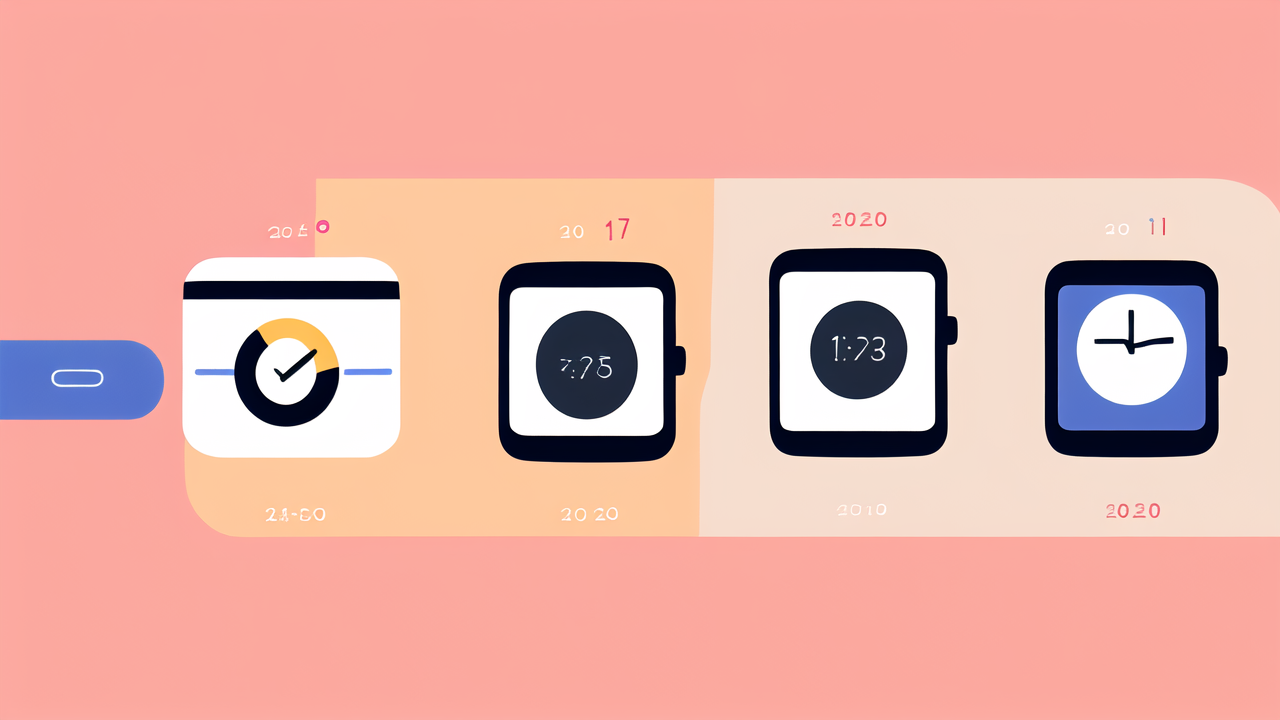The Evolution of Smart Watches: From Niche to Mainstream
The Origins of Smart Watches and Their Functional Attributes
Smart watches have come a long way since their inception. They started as simple digital timepieces with basic functions. Early models could store contacts and do basic calculations. As technology advanced, so did their capabilities. The first true smart watches emerged in the early 2000s. These devices could connect to phones and display notifications. They also introduced features like fitness tracking and GPS navigation. The main goal was to make our lives easier by putting information at our wrists.

Milestones in Smart Watch Technology and Adoption Trends
The smart watch industry has seen rapid growth and innovation. Key milestones include:
- 2012: Pebble launches, kickstarting the modern smart watch era
- 2014: Apple introduces the Apple Watch, bringing smart watches to the mainstream
- 2015: Android Wear (now Wear OS) debuts, offering a platform for various manufacturers
- 2017: LTE-enabled smart watches allow for phone-free cellular connectivity
- 2020: Advanced health monitoring features become standard in many models
Adoption trends show a steady increase in smart watch ownership. More people are seeing the value in these wearable devices. The COVID-19 pandemic also boosted interest in health-tracking features.
The Role of Fashion in Smart Watch Popularity
Fashion has played a crucial role in smart watch popularity. Early models were often bulky and unattractive. This limited their appeal to tech enthusiasts. As designs improved, smart watches became more fashionable. Brands started offering customizable straps and watch faces. Luxury watchmakers entered the market, blending tradition with technology. Fashion-forward designs helped smart watches appeal to a broader audience. Now, there are options for every style preference, from sporty to elegant.
The Technological Advancements Driving Smart Watches Forward
Innovations in Smart Watch Features and Connectivity
Smart watches continue to evolve with new features and improved connectivity. Recent innovations include:

- Longer battery life through more efficient processors
- Always-on displays that don't drain power
- Improved water resistance for swimming and diving
- Voice assistants for hands-free control
- NFC technology for contactless payments
Connectivity has also improved. Many smart watches now offer standalone cellular connections. This allows users to make calls and send messages without a phone nearby. Wi-Fi and Bluetooth capabilities have been enhanced for faster data transfer and wider range.
Health and Wellness: The New Frontier in Smart Watch Development
Health and wellness features have become a major focus in smart watch development. Modern devices can:
- Monitor heart rate and detect irregular rhythms
- Track sleep patterns and quality
- Measure blood oxygen levels
- Detect falls and call for help
- Provide stress management tools
- Track various workouts and activities
Some smart watches can even take ECG readings or monitor blood pressure. These features make smart watches valuable tools for managing personal health. They can alert users to potential issues and encourage healthier habits.
The Impact of AI and Machine Learning on Smart Watches
AI and machine learning are revolutionizing smart watch capabilities. These technologies enable:
- More accurate health and fitness tracking
- Personalized workout recommendations
- Predictive text input for messaging
- Improved voice recognition for commands
- Adaptive battery management for longer use
AI also helps smart watches learn user habits and preferences. This allows for more tailored experiences and proactive assistance. As AI continues to advance, smart watches will become even smarter and more helpful companions.
Navigating the Smart Watch Market in the United States
Key Players and Market Leaders in the Smart Watch Industry
The US smart watch market is dominated by a few key players:

- Apple: Leads with the Apple Watch series
- Samsung: Offers Galaxy Watch models
- Fitbit: Known for fitness-focused devices
- Garmin: Popular among outdoor enthusiasts and athletes
- Fossil: Blends traditional watch design with smart features
Other notable brands include Huawei, Amazfit, and TicWatch. Each company targets different segments of the market. Some focus on high-end features, while others aim for affordability. Competition drives innovation and keeps prices in check for consumers.
Consumer Preferences and Demand Shifts for Smart Watches
Consumer preferences for smart watches have evolved over time. Key trends include:
- Increased demand for health and wellness features
- Preference for longer battery life and faster charging
- Interest in customizable designs and interchangeable bands
- Desire for standalone functionality without needing a phone
- Growing appeal among older adults for health monitoring
Price remains a factor, but many consumers are willing to pay more for advanced features. There's also a shift towards smart watches as fashion accessories, not just tech gadgets. This has led to more diverse designs and collaborations with fashion brands.
The Future of Smart Watches: Predictions and Market Projections
The future of smart watches looks bright, with several exciting possibilities:
- Integration of more advanced health sensors
- Improved battery technology for multi-day use
- Flexible or rollable displays for larger screens
- Enhanced AR capabilities for navigation and information display
- Greater integration with smart home devices and IoT ecosystems
Market projections suggest continued growth in the smart watch industry. Analysts predict a compound annual growth rate of over 20% in the coming years. This growth will be driven by technological advancements and increasing health consciousness. As smart watches become more capable and affordable, they're likely to become as common as smartphones.




Leave a comment
This site is protected by hCaptcha and the hCaptcha Privacy Policy and Terms of Service apply.